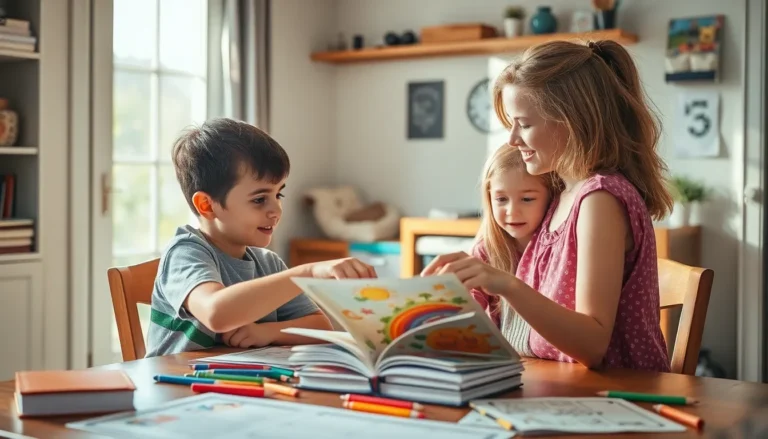Table of Contents
ToggleParenting isn’t a one-size-fits-all gig. With so many styles out there, it can feel like trying to choose a favorite pizza topping—everyone’s got an opinion, and no one can agree on what’s best. From the authoritative to the permissive, each parenting style offers a unique recipe for raising kids.
Overview of Parenting Styles
Parenting styles significantly influence child development. Each style contributes uniquely to a child’s emotional and social growth. Authoritative and permissive stand out as two primary approaches. Authoritative parenting combines structure and support, fostering independence while maintaining clear boundaries. It encourages children to make decisions within set guidelines, promoting self-discipline.
On the other hand, permissive parenting prioritizes indulgence over rules. This approach allows children significant freedom, often leading to challenges in self-regulation. The balance between support and structure can determine children’s ability to manage expectations. A third style, authoritarian parenting, emphasizes strict rules and obedience. This method may create an environment of fear, limiting open communication.
Another emerging model is the uninvolved style. Parents adopting this approach display minimal engagement with their children, which can hinder emotional and psychological development. Research indicates that children from uninvolved backgrounds may struggle with self-esteem and social interactions.
Cultural influences also shape how parents select their approaches. Variances in expectations and traditions can affect decisions around discipline and autonomy. Furthermore, parents often blend styles, adapting strategies that align with their values and beliefs.
Recognition of these diverse styles aids understanding of parental impact on child behavior. Awareness can lead to more intentional parenting choices, directly affecting a child’s lifelong outcomes.
Authoritarian Parenting Style
Authoritarian parenting involves strict rules and high expectations. This approach often prioritizes obedience over open dialogue with children.
Characteristics
Strict control defines authoritarian parenting. Parents often enforce rules without room for flexibility or discussion. Limited emotional warmth characterizes this style, leading to compliance without connection. Punishments are frequently used to maintain discipline, emphasizing obedience over understanding. Children may feel valued only when they follow directives. This style discourages independence and critical thinking, as decisions are made solely by parents.
Effects on Children
Children raised in authoritarian households may exhibit various behavioral patterns. Increased anxiety often results from constant pressure to conform. They might struggle with self-esteem, as their worth is tied to submission rather than individuality. Communication skills often suffer due to limited opportunities for dialogue at home. Moreover, these children may develop rebellious tendencies as they grow older. Long-term effects can include difficulties in social situations and challenges in forming healthy relationships.
Permissive Parenting Style
Permissive parenting involves a hands-off approach, where parents allow children significant freedom with few rules. This style emphasizes nurturing and responsiveness but often lacks the structure found in other approaches.
Characteristics
Permissive parents typically prioritize their child’s wishes over setting boundaries. They often avoid confrontation and strive to be more of a friend than a disciplinarian. Emotional support and open communication play crucial roles in these families. Additionally, decision-making frequently rests with the child, leading to a relaxed household environment. Parents might indulge their children’s desires and needs, promoting creativity and self-expression while sacrificing consistent guidelines.
Effects on Children
Children raised in permissive households tend to struggle with self-discipline and impulse control. Research indicates these children may have difficulty adhering to rules, both at home and in school settings. They often expect immediate gratification, which can lead to challenges in delayed satisfaction. Furthermore, such children may develop low self-esteem if they perceive themselves as unable to manage responsibilities. Developing social skills and healthy relationships may also present difficulties, as these children might struggle with authority and boundaries.
Authoritative Parenting Style
Authoritative parenting balances structure and support, fostering a nurturing environment. This style encourages open communication while maintaining clear expectations.
Characteristics
Authoritative parents exhibit warmth and responsiveness, making strong emotional connections. Discipline is consistent yet flexible, with rules accompanied by explanations. They value independence, allowing children to explore within safe boundaries. Active involvement in children’s lives promotes engagement and guidance. Parents often adapt their approaches based on a child’s needs. Flexibility in decision-making helps develop critical thinking skills.
Effects on Children
Children raised by authoritative parents often demonstrate higher self-esteem and better social skills. They tend to exhibit resilience when faced with challenges. Academic success frequently correlates with this style, leading to higher achievement levels. Additionally, children learn to express their feelings and opinions constructively. Strong family bonds enhance emotional intelligence and interpersonal relationships. Such youth also display better impulse control and decision-making abilities, promoting overall well-being.
Uninvolved Parenting Style
Uninvolved parenting, often termed neglectful, features minimal engagement from parents. This style lacks emotional and physical presence, which can markedly affect child development.
Characteristics
Low levels of supervision define uninvolved parenting. Parents typically show little interest in their children’s lives or activities. Emotional connection may be absent, resulting in parents not offering support or guidance. Household rules are often vague or nonexistent, leading to confusion about expectations. Time spent together rarely occurs, making it challenging for children to establish bonds. Prioritization of personal pursuits over the child’s needs is common, ultimately creating an environment of detachment.
Effects on Children
Children raised in uninvolved households may experience significant emotional challenges. Research indicates they often face higher risks of depression and anxiety. These children frequently struggle with self-regulation and social skills, making interactions with peers difficult. Academic performance can suffer due to a lack of support and encouragement. Additionally, they may develop a low sense of self-worth, believing they are unimportant or unworthy of attention. Long-term outcomes may include difficulty forming healthy relationships and establishing independence, as they often seek validation outside the home.
Comparison of Parenting Styles
Different parenting styles significantly impact child development and behavior. Authoritative parenting combines structure and support, encouraging independence while setting clear boundaries. Parents in this style promote open communication, displaying warmth and responsiveness. Their consistent yet flexible discipline helps children explore safely and develop critical thinking skills.
In contrast, permissive parenting takes a hands-off approach, allowing children substantial freedom and few rules. This nurturing style fosters self-expression and creativity. However, a lack of structure can lead to challenges with impulse control and self-discipline, making it difficult for children to adhere to rules and develop social skills.
Authoritarian parenting is characterized by strict rules and high expectations, placing a strong emphasis on obedience. This approach lacks emotional warmth, often relying on frequent punishments. Children in authoritarian households might face increased anxiety and low self-esteem as they navigate a discipline-focused environment, sometimes leading to rebellious behavior.
Uninvolved parenting, also known as neglectful parenting, features minimal engagement and supervision. Parents often show little interest in their children’s lives, resulting in vague expectations and household rules. Children raised in such environments may struggle with emotional issues and experience difficulties in social skills and academic performance due to a lack of support.
Cultural influences play a crucial role in shaping these parenting styles. Variations in expectations and traditions affect how parents approach discipline and autonomy. By recognizing and understanding these diverse styles, parents can make more intentional choices regarding their approach, ultimately positively influencing children’s lifelong outcomes. Authority figures cultivate self-esteem, resilience, and emotional intelligence, setting a foundation for success in various aspects of life.
Understanding the variety of parenting styles is crucial for fostering healthy child development. Each approach carries its own set of benefits and challenges that can shape a child’s emotional and social growth. By recognizing the unique characteristics of authoritative, permissive, authoritarian, and uninvolved styles, parents can make informed decisions that align with their values and beliefs.
This awareness not only enhances parenting effectiveness but also promotes intentional choices that support children’s lifelong success. Ultimately, the goal is to cultivate resilient, self-aware individuals capable of navigating life’s challenges with confidence and emotional intelligence.







